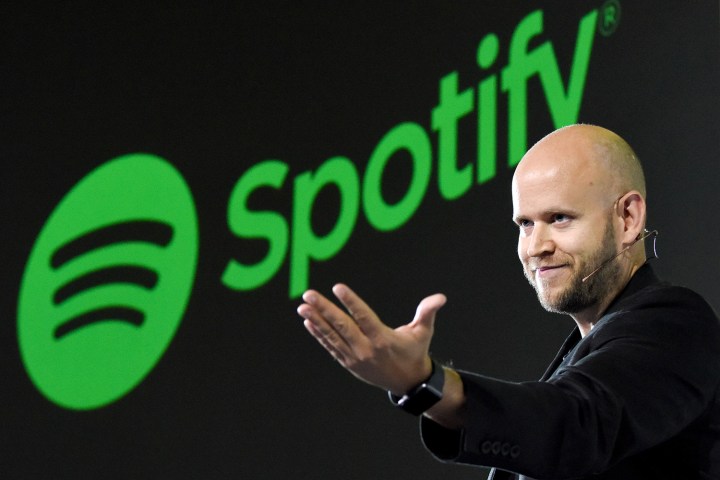Payment Failed Try Again or Use a Different Payment Method Resigning Up for Spotify Student

Spotify CEO, Daniel Ek (Toru Yamanaka/Getty Images)
Today, any would-be investor is able to buy a piece of the most popular on-demand music streaming service on Earth: After years of rumors, Spotify has gone public. It may sound like an opportunity akin to getting in early on purchasing Amazon or Netflix stock, but don't call up your broker just yet. This is a complicated situation, and one you may wish to steer clear of.
Spotify, the Swedish streaming service that boasts more than 159 million monthly listeners, divulged plans to go forward with a direct listing, a form of going public that differs from the usual investment bank-backed Initial Public Offering (IPO) in that no new shares will be issued upon its debut, late last year. The only shares available to the public at the time of its launch were those owned by company insiders and early investors, who may eventually sell large chunks of their shares to set a steady price on the public market. The company is called SPOT on the New York Stock Exchange.
Shares opened at $168 at 12:45 pm EST, and were hovering near $155 by a little after 2 pm EST.
While Spotify is a much-beloved household name around the globe, the company has a long history of losing money hand over fist.
While some are touting the move as a groundbreaking method for a high-profile tech company to sneak into the public marketplace without paying the hefty fees investment banks typically tack onto their IPO deals (for some context, Alibaba reportedly paid around $300 million to the banks behind its $21.8 billion IPO), the reality appears much bleaker when you take a look at Spotify's financial statements.
Though the Swedish music streamer is a much-beloved household name around the globe — and the favorite streaming service among the Digital Trends staff — for its excellent interface and music discovery options, the company has a long history of losing money hand over fist. According to financial statements released in association with its filing, Spotify lost $1.5 billion in 2017, up from $584 million in 2016 and $257 million in 2015, despite a massive increase in revenue from $3.1 billion to $4.98 billion.
With that in mind, it's likely the company's largest private shareholders want to avoid going the traditional route of an IPO so they can instead sell the large volumes of shares needed to successfully launch the company on the public market from their own portfolios over the first few months of it hitting the public market. By doing this, they pass the company's less-than-stellar financial reality onto less-aware newcomers.
By unloading their piece of a very unprofitable company, valued at around $20 billion, these private investors can re-invest in some other, more stable opportunity and entirely avoid the tough task of figuring out how Spotify can leverage a hugely popular brand into a legitimately successful business enterprise. In a tech universe in which brand name awareness heavily drives investment — especially among less experienced investors — it could work. But while private Spotify backers may have figured out a way to profit off the unprofitable, their ability to sell shares doesn't solve the big issues that plague the streaming industry at large.

Despite its ever-increasing popularity, it's not a secret that no company has figured out how to make music streaming a profitable enterprise at scale. Even massively popular services like Soundcloud have been hanging by a thread for years, facing ever-increasing losses, and hoping to avoid the fate of companies like Rdio, Grooveshark, MOG, and other now-defunct services.
But Spotify also faces another stumbling block: The other frontrunner in the space, Apple Music, has the backing of one of the most valuable companies on the planet, and could theoretically run on massive loss margins indefinitely. Given the history of poor profit-to-revenue ratios in the space, this could actually have been a central part of Apple Music's long-term business plan at launch: Outlast the competition.
Beyond the vexing issue of dealing with an ever-looming competitor with bottomless pockets, Spotify also has ongoing legal battles with rights holders, such as a $1.6 billion lawsuit currently aimed at the company from high-profile music publisher Wixen Publishing (Tom Petty, The Doors). It's also seen numerous longtime executives exit over the past year, most recently chief content officer Stefan Blom. When you imagine owning a chunk of the service from the perspective of its current private shareholders, it's easy to see how the risk averse will want to cash out their chips and move on to the next table.
It's not a secret that no company has quite figured out how to make music streaming a profitable enterprise.
If there is one silver lining in the cloud of negative cash flow and lawyer's fees, it's that Spotify remains the front-runner in one of the fastest-growing media industries on earth. If the company can cut costs by taking drastic actions like shelving its free service side — which accounts for about 70 million of its monthly listeners, and therefore a decent amount of its infrastructure cost — perhaps Spotify can figure out a way to stop bleeding cash.
Regardless of whether or not Spotify sees a successful first day on the public market, one thing is certain: The company needs to figure out a way to make a profit, even if it's marginal. It can't operate indefinitely with massive losses on its books, or share values will plummet.
How long public shareholders will be willing to stick around on the promise of future profits remains to be seen, but if longtime investors are considering this a good time to exit, those considering buying stock when it goes public should thoroughly weigh their options — and the company's profit margins — before digging into their pockets to buy shares, no matter how much they love their Discover Weekly playlist. The fact of the matter is: Spotify is a hugely popular service, but that doesn't make it too big to fail.
Editors' Recommendations
- Spotify's services are slowly returning to normal after Google Cloud problem
- Spotify Plus might give free users unlimited track skipping for $1 per month
- Spotify hits repeat on its Premium special offer: $1 a month for 3 months
- The new Spotify + Hulu bundle could save you some green
- Spotify has reached a big milestone in paid subscribers
Source: https://www.digitaltrends.com/music/is-spotify-too-big-to-fail/
0 Response to "Payment Failed Try Again or Use a Different Payment Method Resigning Up for Spotify Student"
Post a Comment